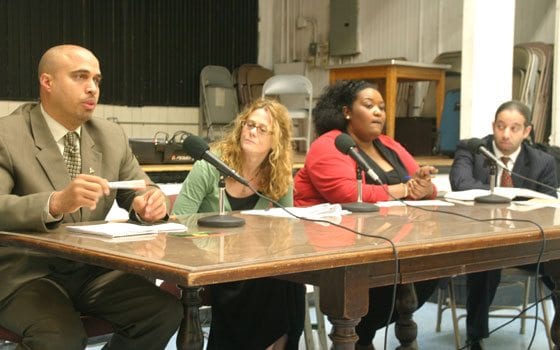
As part of an initiative to include the voices of black parents in the debate over school reform, education activists gathered at the Freedom House last week for a wide-ranging discussion on how best to meet the needs of Boston students.
Panelists at the meeting last week said improvements in the city’s schools will depend on increased community involvement, a curriculum that is relevant to the lives of black children and better conditions in the communities where the majority of Boston’s students live.
“You have to pay attention to the conditions in the neighborhoods,” said Susan Eaton, director of the Charles Hamilton Houston Institute for Race and Justice at Harvard University. “When you look at disparities and the achievement gap, you’ll see the children not achieving correlates directly to neighborhood disparities.”
Later in the meeting, City Councilor Ayanna Pressley echoed Eaton’s contention, noting that problems, like hunger, family dysfunction and teen pregnancy – the greatest factor in dropout rates among girls – weigh heavily on educational outcomes in Boston.
“You can dress up a building, but if they don’t come in there well rested and well fed, it’s all for naught,” Pressley said.
The more than 50 percent of black students who drop out of the system are an indicator of the depth of the disparities in the Boston schools. The dropout rate is also a driving force behind efforts to increase the participation of black parents in school policy.
“The people in the community have to be actively engaged in the process,” said Horace Small, executive director of the Union of Minority Neighborhoods.
Last year Small launched Black People for Boston Public Schools, an initiative to facilitate greater community engagement in school reform. Last week’s forum, held at the Freedom House, was part of the group’s effort.
“We have to be able to say we’re at the table and we have power,” said Janine Quarles, who heads the initiative. “It’s essential that the whole community be advocates for public education.”
In addition to holding neighborhood forums, Small says the group will conduct trainings on advocacy and grassroots organizing.
At last week’s meeting, which drew about 40 participants, Boston Schools Assistant Chief Operating Officer Sam Depina said parental involvement and advocacy are crucial to the success of the schools.
“In schools that are successful, you’ll find great relationships between the staff, the students and the parents,” he commented.
This year, the school department will likely contend with budget cuts that will force school closures, as the gap between rising costs and declining state revenues widens.
At the same time, Massachusetts may likely receive federal Race to the Top funds that will mandate the creation of more charter schools. Panelists at last week’s forum agreed that charter schools will not provide any long term solutions for Boston, or any other school district.
Social Justice Academy Director Winston Cox pointed out that that charter schools tend not to serve Special Education students or students learning English as a second language.
“You have many black and Latino parents who feel [charter schools] are the only lifeline out of an abysmal system,” he said. “If we’re not careful, it can be used to drive a wedge in our community.”
Audience members expressed enthusiasm for working on improving the city’s schools, speaking disparagingly of the appointed school committee, the Boston Teachers’ Union and the current school assignment policies. Many also expressed frustration with impending budget cuts, which will likely see some schools closed and layoffs of staff.
Small said the trainings and forums Black People for Boston Public Schools have held demonstrate that there is sufficient will in the community to make positive changes happen.
“The black community is coming together in an unprecedented way,” Small said. “Immigrants and African American people are talking to each other. People in the community want to be actively engaged in the process.”






